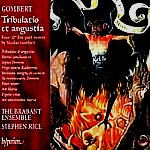Stephen Rice and his Brabant Ensemble have chosen well in bringing attention to the motets of Nicolas Gombert–music that’s unfairly been neglected on disc but that once heard tends to leave a lasting impression, of both the musical and spiritual kind. The tone and texts of many of the motets are penitential, others–the Pater noster, Ave Maria, and Ave sanctissima Maria, for example–are strictly liturgical; but with the exception of the relatively joyful (and short–only 3 minutes!) four-part Virgo sancta Katherina, scored for three trebles and alto, virtually all of these works project an awe-inducing majesty and solemnity, unfolding over many minutes of nearly cadence-free waves of rich-textured polyphony. Pungent dissonances play an integral role in the overall structure, as do repeated-note fragments and brief melodic segments whose impact can be quite striking, especially when introduced in the treble register and then passed through the other voices.
It would be impossible to name a highlight–the magnificent Tribulatio et angustia; the grand Aspice Domine; the profoundly moving Pater noster and Ave Maria–because all of these works and performances are exemplary, both as unique creations and as stylistically informed, modern realizations of some of the greatest, yet-to-be-fully-appreciated music of the 16th century.
The 14-voice Brabant Ensemble, whose vibrant, perfectly-tuned sound often gives the impression of a larger group, knows the importance of phrasing, breath control, and long-lined dynamic modulation, all of which are essential to really fire up and fully illuminate these scores. The sound, from what proves to be the ideal acoustics of the chapel of The Queen’s College, Oxford, is perfectly balanced to allow us to hear each vocal line clearly while enabling the ensemble to properly resonate. This is a recording that demands and rewards multiple hearings–and makes a highly recommendable complement to the Tallis Scholars’ set of Gombert Magnificats. Absolutely essential listening!
































